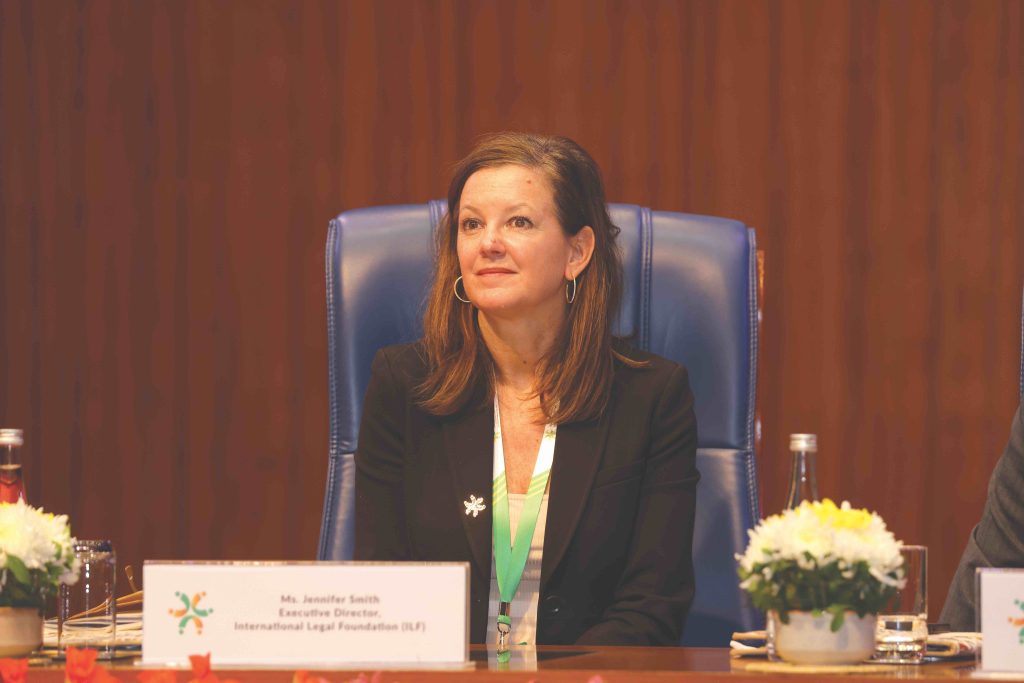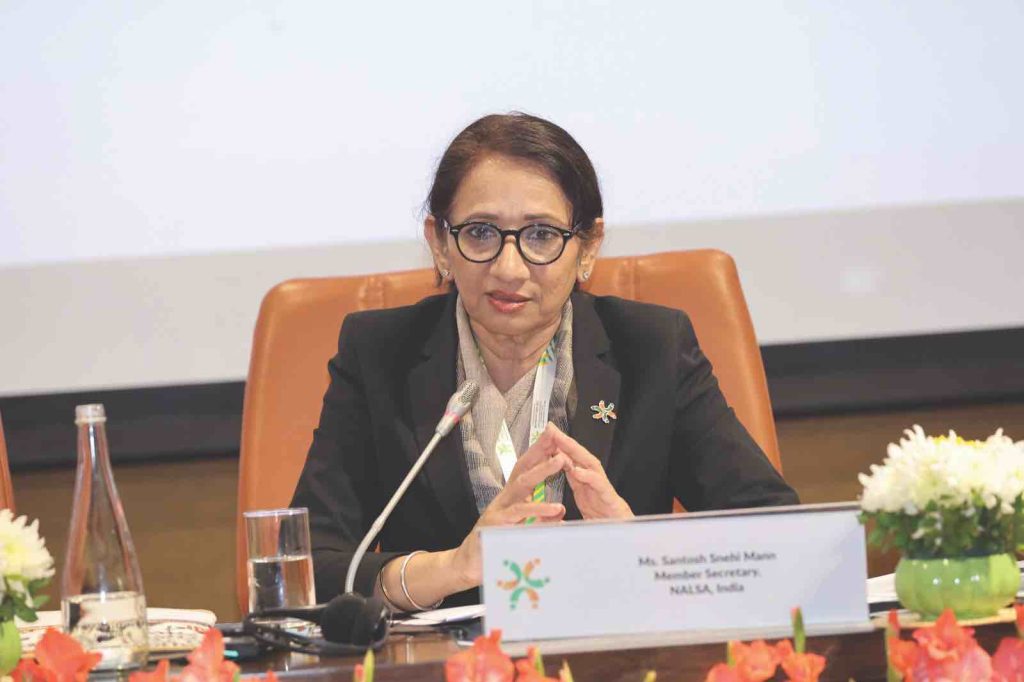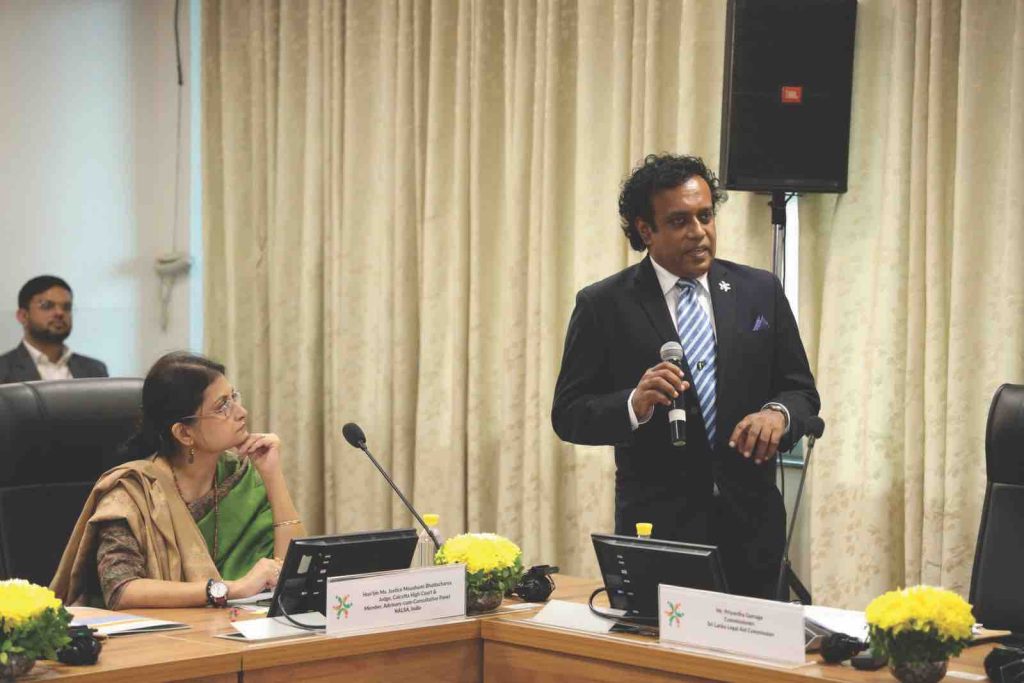Words Priyantha Gamage.

L–R: S.K. Humayun Kabir, Joint Secretary (District Judge), Law and Justice Division, MInistry of Law, Justice and Parliamentary Affairs, Government of Bangladesh; Soledad Herrero, Chief, Child Protection, UNICEF India Country Office; Justice Moushumi Bhattacharya Judge, Calcutta High Court & Member, Advisory-cum-Consulative Panel, NALSA, India; and Priyantha Gamage, Commissioner, Sri Lanka Legal Aid Commission.
“Access to legal services is a basic necessity. If people to justice, the whole legal system is disrepute, and rightly so.” – As mentioned by Nelson Mandela in his opening address to the Law Society of the Transvaal on October 29, 1993. The National Legal Services Authority, India (NALSA), together with the International Legal Foundation (ILF), the United Nations Development Programme (UNDP), and the United Nations Children’s Fund (UNICEF), successfully hosted the first regional conference on access to legal aid in New Delhi, India, on November 27 and 28, 2023, to address the challenges in ensuring access to quality legal aid services in the countries of the Global South. The Global South refers to the countries around the world that are at times described as “developing,” “less developed,” or “underdeveloped.” Many of these countries, as we know, are in the Southern Hemisphere, mainly in Africa, Asia, and Latin America. With the theme Legal Aid: Access to Justice and Sustainable Development, the objective of the first regional conference was to initiate, facilitate, and support partnerships that increase access to legal aid across Africa, Asia, and the Pacific sub-regions of the Global South.
The right to legal aid is enshrined in many international, regional, and other instruments. The United Nations Principles and Guidelines on Access to Legal Aid in Criminal Justice Systems (UNPG) provide that states should “guarantee the right to legal aid in their national legal systems at the highest possible level, including, where applicable, in the constitution” (2013, Principle 1). Principle 2 further provides: States should consider providing legal aid as their duty and responsibility. To that end, they should consider, where appropriate, enacting specific legislation and regulations and ensuring that a comprehensive legal aid system that is accessible, effective, sustainable, and credible is in place. States should allocate the necessary human and financial resources to the legal aid system. Article 14(3)(d) of the International Covenant for Civil and Political Rights (ICCPR) reads that: “In the determination of any criminal charge against him, everyone shall be entitled to be tried in his presence and to defend himself in person or through legal assistance of his choosing; to be informed, if he does not have legal assistance, of this right; and to have legal assistance assigned to him, in any case where the interests of justice so require, and without payment by him in any such case if he does not have sufficient means to pay for it.” Consistent with Article 14 of the International Covenant on Civil and Political Rights of 1966 and the Principles and Guidelines, most states have laws guaranteeing the right to free legal representation for poor and vulnerable persons accused of criminal offenses.
The conference encouraged the participants to develop concrete, action-oriented plans to address challenges related to providing legal aid services in their countries. It also explored opportunities for greater regional and international collaboration and sharing of innovations, knowledge, and strategies, including through a Regional Legal Aid Network.

Priyantha Gamage, Commissioner, Sri Lanka Legal Aid Commission.
As the Special Rapporteur on the independence of judges and lawyers, Gabriela Knaul quipped, Legal aid is both a right and an essential precondition for exercising and enjoying several human rights, including the rights to a fair trial and an effective remedy. “It represents an important safeguard that contributes to ensuring fairness and public trust in the administration of justice.” Thus, legal aid is recognized as a fundamental right and a prerequisite to a fair trial. In simplest terms, a fair trial can be defined as a fair and public hearing by a competent, independent, and impartial tribunal established by law. Equal access to the judicial system and access to legal counsel is one component that makes up a fair trial. In his usual eloquence, Hon’ble Justice Bhagavati explained that legal aid means providing an arrangement in society so that the missionary of administration of justice becomes easily accessible and is not out of reach of those who have to resort to it for enforcement of what is given to them by law. The poor and illiterate should be able to approach the courts, and their ignorance and poverty should not impede their obtaining justice from the courts. Legal aid should be available to the poor and illiterate, who don’t have access to courts. One need not be a litigant to seek aid using legal aid.
The United Nations Principles and Guidelines on Access to Legal Aid in Criminal Justice Systems (Principles and Guidelines) were adopted by the UN General Assembly in December 2012. The first Conference on Access to Legal Aid was held in South Africa in 2014, followed by Argentina in 2016, Argentina in 2018, and Brazil in 2020. The focus of the 2023 Conference in particular was on the need to strengthen legal aid systems in the Asia-Pacific region. The Indian coordinator for this global event was the National Legal Services Authority (NALSA). The NALSA has been constituted under the Legal Services Authorities Act, 1987, to provide free legal services to the weaker sections of society and to organize Lok Adalats for amicable settlement of disputes. The Hon’ble Dr. Justice D. Y. Chandrachud, the Chief Justice of India, is the Patron-in-Chief. Santosh Snehi Mann, Member Secretary, NALSA, India, speaking to the writer, commented that the conference had marked a breakthrough in the global efforts towards strengthening legal aid and access to justice systems, particularly in the Global South. It has laid a strong foundation for South-South cooperation in making the justice systems more efficient, accessible, and people-centric. The recommendations in the conference’s outcome documents will make a real difference in the lives of millions across the Global South. The conference provided an opportunity to exchange knowledge and ideas between legal aid institutions in Asia and Africa. It followed the call made by participants at the 2nd Priyantha Gamage, Commissioner, Sri Lanka Legal Aid Commission. International Conference on Access to Legal Aid in Criminal Justice Systems, held in Argentina in 2016, for conferences to be organized at the regional level to enable discussion of progress, challenges, and the exchange of good practices, foster collaborations, and search for solutions.
Jennifer Smith, Executive Director of The International Legal Foundation (ILF), speaking to the writer about the massive success of the event, said: “As the leading global advocate for the right to legal aid, the International Legal Foundation was proud to co-sponsor the first regional conference on access to legal aid in Delhi, India. Ten years after the adoption of the UN Principles and Guidelines on Access to Legal Aid in Criminal Justice Systems, the vast majority of people accused of crimes globally still do not have access to a qualified lawyer. Without legal aid, poor and marginalized people are more likely to experience rights violations, discrimination, wrongful convictions, and harsher punishments. This is not equal justice. The conference brought together nearly 200 government officials, legal aid providers, and experts from 51 countries in Asia and Africa to share knowledge and strategies to address this urgent justice crisis. We look forward to seeing the good practices, reforms, and partnerships that will grow from this first regional conference.” The Conference highlighted regional efforts to implement the United Nations Principles and Guidelines on Access to Legal Aid in Criminal Justice Systems and the United Nations Standard Minimum Rules for the Administration of Juvenile Justice, or Beijing Rules, and to further the Agenda for Sustainable Development Goals 2030 (SDG). Access to effective legal aid services is vital for attaining Target 16.3 of the Sustainable Development Goals 2030, which seeks to ensure equal access to justice for all. The Principles and Guidelines also affirm that states should implement a comprehensive legal aid system that is accessible, effective, sustainable, nationwide, and available to all persons without discrimination. Legal aid provides a foundation for a fair and effective justice system based on the rule of law.

Jennifer Smith, Executive Director of The International Legal Foundation (ILF).

Santosh Snehi Mann, Member Secretary, NALSA, India.
The rule of law is a durable system of laws, institutions, norms, and community commitment that delivers four universal principles: accountability, just law, open government, and accessible and impartial justice, as per the World Justice Project. Further, a critical component of a child-friendly justice system is for children to have access to specialized legal aid services. Legal aid providers can make an enormous difference in determining whether children will go into detention, whom they will live with, and whether they will have access to education. Soledad Herrero, Chief of Protection-India, United Nations Children’s Fund (UNICEF), speaking to the writer, stressed the need for child-friendly legal aid guidelines and added that ‘A child detained is a testimony of a system failure: a system that was created to protect the very same child deprived of liberty in the first place’. Legal aid is critical to enabling individuals and communities to understand their rights and make informed choices to see them protected and enforced. Moreover, providing legal aid services in civil and administrative matters can advance SDG 16 and equal access to justice for all. Access to legal aid, including legal information, legal counseling, and legal assistance, can resolve justice issues such as eviction from home, family or employment disputes, or obstacles to accessing public services. Progress needs to be made to ensure legal aid extends to all persons who are detained, arrested, suspected of, or charged with a criminal offense, as well as to victims, survivors, and witnesses, to ensure their voices are heard, and to protect and safeguard their rights, including their access to services that address their specific needs for social, psychological, and other protection. The objectives of this regional conference were to raise awareness of the need for legal aid in ensuring equal access to justice for all and to renew commitments to establishing effective, accessible, credible, and sustainable legal aid systems. It provided a platform for the participating countries of the Global South to facilitate the sharing of lessons and best practices on strengthening the delivery of legal aid services and addressing the significant access to justice challenges that exist. It also generated discussion and recommendations that contribute to policies, legislation, and practices that will strengthen the delivery of effective and quality legal aid services across the region. The conference encouraged the participants to develop concrete, action-oriented plans to address challenges related to providing legal aid services in their countries. It also explored opportunities for greater regional and international collaboration and sharing of innovations, knowledge, and strategies, including through a Regional Legal Aid Network. Conference topics, inter alia, included the following:
1 Models of delivering legal aid services, including institutionalized legal aid offices.
2 The role of legal aid in advancing equal access to justice for all.
3 Addressing sustainable funding mechanisms and innovative financing models to ensure resources for state-funded legal aid.
4 The role of bar associations, university clinics, paralegals, civil society, and community-based organizations is to deliver legal aid services and partner with public legal aid providers.
5 Good practices for measuring the impact of a legal aid representation.
6 Strategies for improving the quality and effectiveness of legal aid services.
7 Strategies for reducing pretrial detention, including through the provision of early access to legal aid services.
8 Special measures to ensure meaningful access to legal aid for the poor, vulnerable, and marginalized groups and address the criminalization of poverty.
9 Legal aid in civil and administrative law matters.
10 Core components of child-friendly legal aid systems and their impact on advancing children’s rights, including non-custodial detention and diversion.
11 The role of legal aid in restorative justice processes, mediation, and alternative dispute resolution.
12 Models for and the benefit of providing more holistic, people-centered legal aid services.
Simone Boneschi, Program Specialist of the United Nations Development Programme (UNDP), speaking to the writer, stated: “UNDP has recently concluded a comprehensive global evaluation of its access to justice programming over the past decade. It emphasizes the critical need to champion a people-centered approach to justice, positioning individuals and their empowerment at the core of our justice systems. This ensures that justice systems effectively address the needs and uphold the human rights of individuals in alignment with the Sustainable Development Goals, preventing injustices, fostering social transformation and cohesion, and enhancing public trust in state institutions. By prioritizing a robust reliance on data and evidence and analogous to the provision of public services such as health and education, the people-centered approach to justice functions as a transformative tool to enable governments to deliver public justice goods and build a compelling case for increased global and national investment in access to justice.” The ministers and representatives of the Ministries of Justice of the Global South nations met at a roundtable organized on the sidelines of this conference titled ‘Advancing the Agenda for Sustainable Development 2030: Access to Justice in the Global South’. Twenty-one Chief Justices and judges from fifteen countries in the Global South came together to be a part of the Chief Justices’ Roundtable on Equal Access to Justice for All in the Global South alongside the Conference.
The Round-table was conceptualized to strengthen south-south cooperation and exchange learnings and good practices to further efforts to ensure equal access to justice for all. In conclusion, delegates discussed and agreed to prepare and adopt the “New Delhi Statement on Advancing the 2030 Agenda for Sustainable Development: Access to Justice in the Global South.” It was further agreed that the statement would be reviewed and adopted at the next ministerial roundtable to be organized virtually during 2024 by the Government of India. The outcome document drafted after the conference memorialized perspectives, lessons learned, and good practices and strategies discussed during two plenary sessions and ten parallel sessions on strengthening access to legal aid and ensuring equal access to justice. A key message was that legal aid provides a foundation for a fair and effective justice system based on the rule of law, yet many justice systems fail to meet people’s justice needs. Further, they are not meeting their obligation to provide persons detained, arrested, suspected, or accused of a criminal offense with the right to legal assistance. The outcome document highlights strategies for removing barriers to access to legal aid, innovations, and good practices for increasing financing. It also highlights strategies for people-centered delivery of quality, data-driven, evidence-based legal aid services, combating discrimination, and providing specialized, child-friendly legal aid. Finally, the outcome document focused on the impact of quality legal aid services, including reducing pretrial detention, advancing the right to a fair trial, and resolving unmet justice issues such as house evictions or family or employment disputes.

Justice Moushumi Bhattacharya Judge, Calcutta High Court & Member, Advisory-cum-Consulative Panel, NALSA, India and Priyantha Gamage, Commissioner, Sri Lanka Legal Aid Commission.





